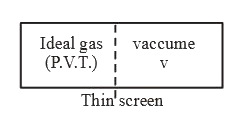When an ideal gas expands in vaccum, there is neither absorption nor evolution of heat. Explain.
Step-by-Step Solution:
1. Understanding Ideal Gas Behavior:
- An ideal gas is defined as a gas that follows the ideal gas law perfectly and has no intermolecular forces of attraction or repulsion. This means that the gas particles do not interact with each other.
2. Expansion in Vacuum:
- When an ideal gas expands in a vacuum, it is expanding against an absence of pressure (since a vacuum has no opposing force).
3. Work Done During Expansion:
- The work done (W) by the gas during expansion can be calculated using the formula:
W=−PΔV
where P is the pressure and ΔV is the change in volume. In the case of expansion against a vacuum, the external pressure (P) is zero. Therefore:
W=−0×ΔV=0
- This means that no work is done by the gas during the expansion.
4. Internal Energy of the System:
- The internal energy (U) of an ideal gas depends only on its temperature. Since no work is done and there is no heat exchange (as we will see next), the internal energy remains constant during the expansion.
5. Heat Exchange:
- According to the first law of thermodynamics, the change in internal energy (ΔU) is given by:
ΔU=Q−W
where Q is the heat added to the system. Since W=0 and ΔU=0 (as the internal energy remains constant), we can conclude:
0=Q−0⟹Q=0
- This indicates that there is neither absorption of heat (Q > 0) nor evolution of heat (Q < 0) during the expansion.
6. Conclusion:
- Therefore, when an ideal gas expands in a vacuum, there is no absorption or evolution of heat because there are no intermolecular forces acting on the gas, no work is done, and the internal energy remains constant.
- An ideal gas is defined as a gas that follows the ideal gas law perfectly and has no intermolecular forces of attraction or repulsion. This means that the gas particles do not interact with each other.
- When an ideal gas expands in a vacuum, it is expanding against an absence of pressure (since a vacuum has no opposing force).
- The work done (W) by the gas during expansion can be calculated using the formula:
W=−PΔV
where P is the pressure and ΔV is the change in volume. In the case of expansion against a vacuum, the external pressure (P) is zero. Therefore:
W=−0×ΔV=0
- This means that no work is done by the gas during the expansion.
- The internal energy (U) of an ideal gas depends only on its temperature. Since no work is done and there is no heat exchange (as we will see next), the internal energy remains constant during the expansion.
- According to the first law of thermodynamics, the change in internal energy (ΔU) is given by:
ΔU=Q−W
where Q is the heat added to the system. Since W=0 and ΔU=0 (as the internal energy remains constant), we can conclude:
0=Q−0⟹Q=0
- This indicates that there is neither absorption of heat (Q > 0) nor evolution of heat (Q < 0) during the expansion.
- Therefore, when an ideal gas expands in a vacuum, there is no absorption or evolution of heat because there are no intermolecular forces acting on the gas, no work is done, and the internal energy remains constant.
Topper's Solved these Questions
- THERMODYNAMICSBOOK - MODERN PUBLICATIONCHAPTER - THERMODYNAMICSEXERCISE - Revision Exercise (Short Answer Questions ) (Fill in the blanks : )
5 Videos
- THERMODYNAMICSBOOK - MODERN PUBLICATIONCHAPTER - THERMODYNAMICSEXERCISE - Revision Exercise (Short Answer Questions)
62 Videos
- THERMODYNAMICSBOOK - MODERN PUBLICATIONCHAPTER - THERMODYNAMICSEXERCISE - Revision Exercise (Assertion Reason Questions)
15 Videos
- STRUCTURE OF ATOMBOOK - MODERN PUBLICATIONCHAPTER - STRUCTURE OF ATOMEXERCISE - Unit Practice Test
13 Videos
Similar Questions
Knowledge Check
When a gas expands adiabactically
Ano energy is required for expansionBenergy is required and it comes from the wall of the container of the gasCinternal energy of the gas in use in doing workDlaw of conservation of energy does not holdWhen a gas expands adiabatically
ANo energy is required for expansionBEnergy is required and it comes from the wall of the container of the gasCInternal energy of the gas is used in doing workDLaw of conservation of energy does not holdAn ideal gas undergoing expansion in vaccum shows
AΔE=0Bw=0Cq=0DAll of these
Matter expands on heating. Explain
View SolutionIf ideal gas expand against vaccum, insulated container then what will be final volume, final pressure & final temperature

View SolutionThe volume of a gas expands on heating.
View SolutionAn ideal gas undergoing expansion in vacuum shows:
View SolutionFor an ideal gas expanding adiabatically in vacuum,
View Solution
